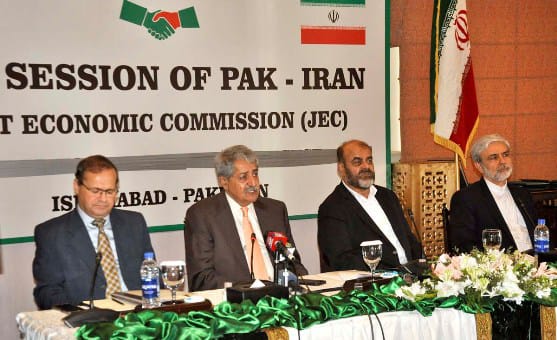Islamabad August 18 2022: Federal Minister for Commerce, Syed Naveed Qamar Thursday said that Iran and Pakistan would give final shape to the proposed bilateral Free Trade Agreement (FTA) in the coming six months.
After signing the FTA between the two countries, free trade would increase and the volume of bilateral trade would reach $4 billion, he hoped.
Syed Naveed Qamar stated this while talking to the media persons along with Iranian Minister for Roads and Urban Development, Rostam Ghasemi after the 21st Session of Pak-Iran Joint Economic Commission (JEC) which was held here from August 16 to 18.
Iranian Minister for Roads and Urban Development, Rostam Ghasemi along with a delegation of 57 dignitaries participated in the 21st Session of Pak-Iran JEC.
Federal Commerce Minister, Syed Naveed Qamar said that in the FTA, both the sides would negotiate to reduce tariffs and there would be an exchange of trade lists in different sectors of the two countries.
He said that an agreement would be signed for promoting transit trade in the next three months, through which free economic zones would be established in the two countries.
Naveed Qamar said that for the promotion of transit trade, it had been decided to establish six border markets, in which, the work on establishment of three border markets had already been started and work would be started on the other three soon.
The initiative would promote free trade on both sides of the border and increase the mutual trade, he said.
The minister said that it was time for final agreements and practical work for which both the countries had agreed.
He said that the national airlines of the two countries had expressed their willingness to promote mutual cooperation.
The minister said that relations between the two countries were deep rooted, adding
“We share the bonds of history, religion, geography, culture and traditions”
He said that Iran was the first country to recognize Pakistan as an independent state in 1947.
“We believe that the relations between the two governments and the people provide a platform for greater bilateral economic cooperation” he said.
The minister said that the Pakistan-Iran Joint Economic Commission provided an institutional framework for a regular review of economic relations and identification of new opportunities for the mutual cooperation.
“Since its inception in 1984, we are now holding the 21st Session of the JEC, which is a clear indication of the endeavors of both the countries to sustain and foster our economic relations”, he added.
Syed Naveed Qamar said the government was also well aware of its future challenges, which encompassed knowledge economy, inclusive growth, institutional reforms, entrepreneurship led-growth and regional connectivity with state of the art infrastructure.
He said that Pakistan was experiencing continued growth momentum since the last four years.
The minister said that trade and economic relations between the two countries were based on diverse areas such as energy, infrastructural cooperation, financial assistance and commercial exchanges.
He said that Pakistan placed Iran at a very high level in importance and appreciated its direction towards market-based reforms.
He said that Pakistan looked to the Iranian market and Iranian investors as it offered very friendly trade and investment environment in Special Economic and Industrials Zones under CPEC.
Moreover, the current trade volume did not commensurate with its true potential, he added.
The minister said it was a favorable sign that both the sides were collaborating for the Free Trade Agreement (FTA).
“I request the two sides to implementation Preferential Trade Agreement (PTA) in letter and spirit, and remove Tariff and Non-Tariff Barriers in order to boost trade volume between both countries” he said.
He said that the five Years Strategic Trade Partnership Plan needed to be renewed for next five years (2022-2027) and both the sides were working in that regard in this 21st Session of JEC.
Talking to media persons, Iranian Minister for Roads and Urban Development, Rustam Gahsami said that the 21st JEC would play a very important role in the promotion of mutual trade between the two countries and there were fruitful discussions in many fields including energy and trade.
He said that the two sides had finalized the time frame and promotion of transit trade was very important.
He pointed out that transport, trade and energy were very important for the economies of the two countries.
Four different agreements were signed between the two countries in the 21st Session which included agreements on maritime cooperation, media, tourism and the national museums of the two countries.
The first agreement for media cooperation was signed between Pakistan’s National News Agency, Associated Press of Pakistan (APP) and Iran’s national news Agency ,IRNA.
APP’s Managing Director, Akhtar Munir and the Ambassador of Iran to Pakistan , Syed Mohammad Ali Hosseini signed the agreement.
The second agreement was on maritime cooperation, which was signed by the representative of the Ministry of Defense from Pakistan and the Ministry of Maritime from Iran.
The third agreement was signed for the promotion of tourism, which was signed by representatives of the respective ministries of the two countries.
The fourth agreement was signed by the National museums of the two countries for the promotion of mutual cooperation.










